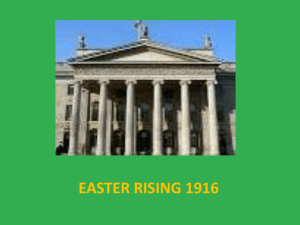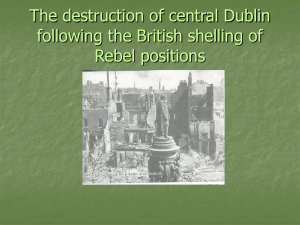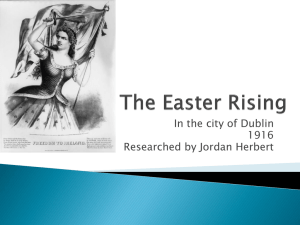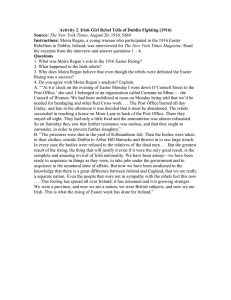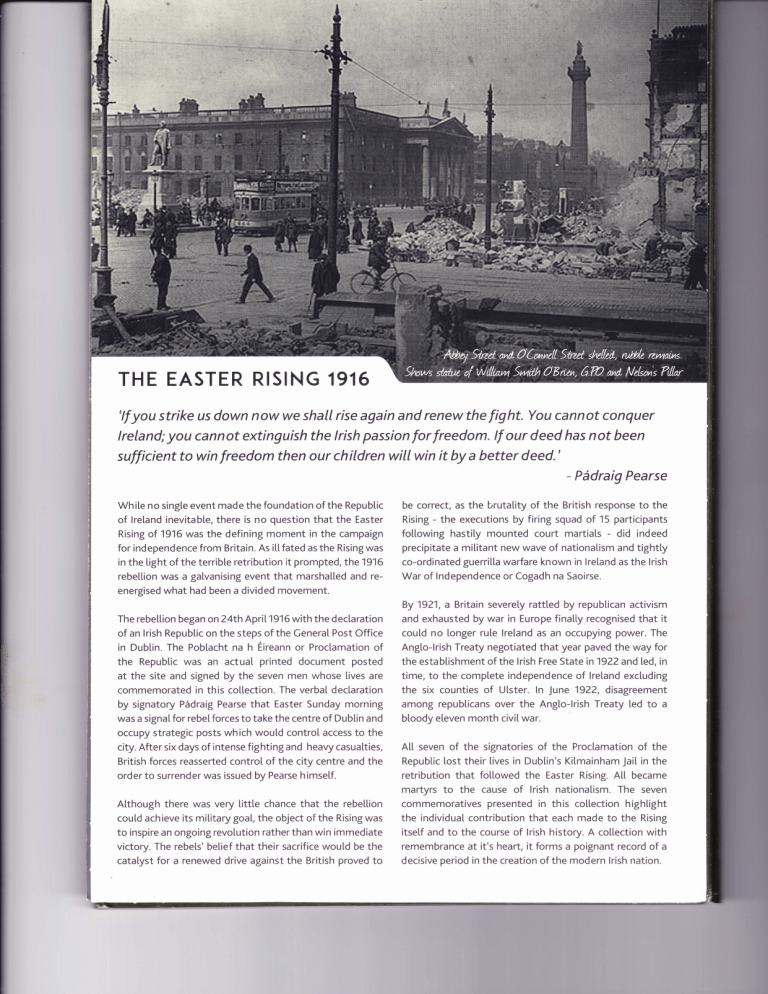
THE EASTER RISING 1916
'lf you strike us down now we shall rise again and renew the fight. You cannot conquer
lreland; you cannot extinguish the lrish passion for freedom. If our deed has not been
sufficientto
win freedom then our children
will win it by a better deed.'
- Pddraig Pearse
White no single event made the foundation of the Republic
of lreland inevitable, there is no question that the Easter
Rising of 1916 was the defining moment in the campaign
for independence from Britain. As itt fated as the Rising was
in the tight of the terrible retribution it prompted, the 1916
rebellion was a galvanising event that marshalled and reenergised what had been a divided movement.
to the
- the executions by firing squad of 15 participants
following hastity mounted court martials - did ind eed
be correct, as the brutality of the British response
Rising
precipitate a mititant new wave of nationalism and tightty
co-ordinated guerrilla warfare known in lreland as the lrish
War of lndependence or Cogadh na Saoirse.
of an lrish Republic on the steps of the Ceneral Post Office
in Dubtin. The Pobtacht na h Eireann or Proclamation of
the Republic was an actual printed document posted
at the site and signed by the seven men whose lives are
commemorated in this col[ection. The verbat declaration
by signatory P6draig Pearse that Easter Sunday morning
By 1921, a Britain severely rattled by republican activism
and exhausted by war in Europe finalty recognised that it
coutd no longer ru[e lreland as an occupying power. The
Anglo-lrish Treaty negotiated that year paved the way for
the establishment of the lrish Free State in1922 and [ed, in
time, to the complete independence of lreland excluding
the six counties of Ulster. In June 1922, disagreement
among republicans over the Anglo-lrish Treaty led to a
was a signatfor rebelforces to take the centre of Dublin and
btoody eteven month civitwar.
The rebe[[ion began
onz{lhAprit
1916 with the declaration
occupy strategic posts which would control access to the
city. After six days of intense fighting and heavy casualties,
Al[ seven of the signatories of the Proclamation of the
British forces reasserted control of the city centre and the
Republic lost their lives in Dublin's Kilmainham Jai[ in the
retribution that followed the Easter Rising. Att became
martyrs to the cause of lrish nationalism. Ihe seven
commemoratives presented in th is collection h ightight
the individual contribution that each made to the Rising
itself and to the course of lrish history. A collection with
remembrance at it's heart, it forms a poignant record of a
order to surrender was issued by Pearse himself.
Although there was very little chance that the rebellion
could achieve its military goa[, the object of the Rising was
to inspire an ongoing revolution rather than win immediate
victory. The rebets' belief that their sacrifice wou[d be the
catalyst for a renewed drive against the British proved to
decisive period in the creation of the modern lrish nation.
I
€l
PADRAIG PEARS E 1879_1916
Padraig Pearse became Organising Director of the lrish Vo[unteers in 19- :
subsequentty a member of the lrish Republican Brotherhood's Suprerne Cc* ^:
It was Pearse who declared a repubtic outside the CPO in Dubtin and authcr s::
surrender on 29th Aprit. Before his execution, he wrote that 'this is the c€a:^
should have asked for if Cod had given me the choice of att deaths'.
.
JAMES CONNOLLY 1858-1916
James Connolty was a Scottish-born socialist of whom fellow rebel Michael Coltins
said'l would have fotlowed him through helt had such action been necessary'. White
directing operations during the Easter Rising, he took a bullet that shattered his foot.
By the time of the surrender, the wound had gone gangrenous. Too ill to even raise
himself, he was executed white strapped to a chair.
THOMAS CLARKE 1858 -1916
Thomas Clarke was the very first signatory of the Proclamation and would have
D:.-
nominated President of the new lrish Republic had the Easter Rising succeece :
Dubtin Cast[e reportedty had a bigger fi[e on Clarke than any other repubLican Vri,:Sean MacDiarmada, he estabIished a Mititary CounciI to p[an the Rising and guid ec
operations alongside James Conno[[y at the CPO.
THOMAS MACDONAGH 1878-1916
Thomas MacDonagh was a relative latecomer to the planning of the Rising, joining
the secret Mititary Council just two weeks before. During the Rising, he led the rebel
garrison atJacob's Biscuit Factory. Fottowing the surrender, he was executed a[ongside
Pearse and Ctarke. MacDonagh's life was celebrated by Francis Ledwidge in the poem
'Lament for Thomas MacDonagh' written in 1917.
SEAN MAC DIARMADA 1885 -1916
Described by his biographer as'the mind of the revotution', Sedn Mac Diarmada was a
trusted point of contact between a[[ the organisaticns involved in the Easter Rising. He
spent much of the week in the GPO itself. While awaiting execut?on he wrote,'the cause
for which I die has been rebaptised during the week by the btood of good men as ever
trod Cod's earth ... I die that the lrish Nation may live.'
JOSEPH PLUNKETT 1887 -1916
The plans adopted for the Easter Rising were mainty those of Joseph Plunkett. Weak
following a throat operation, he stayed in the CPO buitding untiI surrender became
inevitable. At 1.30am on 4th May, he was atlowed to marry his fiancee Crace Cifford
in the chapeI at Kilmainham. They were granted on[y ten minutes together before his
execution.
EAMONN CEANNT
1881
.1916
Appointed Commandant of the 4th Battalion of the lrish Volunteers during the
Easter Rising, Ceannt ted the rebel forces at the South Dublin Union. He
executed on Bth May. ln his last message he declared that'lreland has shown 5.:
is a nation. ln the years to come lre[and wiI honour those who risked alL for A a.
honour at Easter 1916.'
